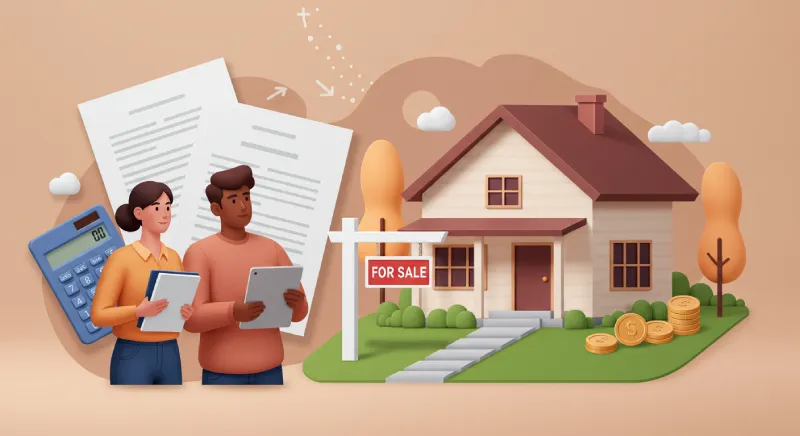In this guide, we’ll explore practical strategies for purchasing an investment property with minimal or no money down, including creative financing methods, leveraging partnerships, and understanding the risks and rewards involved.

1. How Buying Investment Property with No Money Works
When you hear about buying a property with “no money down,” it doesn’t mean no financial commitment at all.
Instead, it refers to financing options that allow you to acquire a property without using your own savings for the down payment. Instead, you’re using other people’s money, resources, or creative strategies.
Here are some key points to consider:
- Leverage: When you buy a property with no money down, you’re using other people’s capital or resources to finance the purchase, rather than your own.
- Creative Financing: This involves using non-traditional means of financing a property, such as seller financing, lease options, or private money lenders.
- Partnerships: Another option is teaming up with other investors or business partners who can contribute the down payment in exchange for a share of the profits.
2. Strategies for Buying an Investment Property with No Money Down
A. Seller Financing
Seller financing occurs when the property seller acts as the lender. Instead of you taking out a traditional mortgage loan from a bank, you make payments directly to the seller over time.
- How It Works: The seller agrees to finance the property for you, and you make regular payments until the loan is paid off, typically at a fixed interest rate. The seller may ask for a down payment, but this is negotiable and can often be minimal.
- Advantages: Seller financing can be especially beneficial if you have a less-than-perfect credit score, as the seller typically isn’t as concerned with your credit history. You also have more flexibility in terms of the loan structure.
- How to Find Seller Financing Deals: Look for properties that have been on the market for a while or owners who are motivated to sell quickly. These sellers are more likely to offer seller financing, especially if they’re trying to sell an older property or are having difficulty securing traditional buyers.
B. Lease Option (Rent-to-Own)
A lease option (also known as rent-to-own) is an agreement where you lease the property for a set period (usually 1-3 years) with the option to buy it later, at an agreed-upon price.
- How It Works: You enter into a lease agreement where you pay rent with the option to purchase the property at a later date, typically at a fixed price. Part of your rent may even go towards the future purchase price.
- Advantages: This is a great way to secure a property without a large upfront investment. You also have the flexibility to walk away from the purchase if the property doesn’t meet your expectations or the market conditions change.
- How to Find Lease Option Deals: Look for motivated sellers who are having trouble selling their property. Some homeowners are willing to rent out their property with the option for the tenant to buy it later, as this gives them steady cash flow.
C. Partner with Other Investors
Teaming up with other investors can be a powerful strategy if you don’t have money for the down payment. In this case, you’ll share the profits with your investment partner(s) in exchange for their contribution to the purchase.
- How It Works: You bring the deal to the table, and your partner provides the capital (down payment or financing). In return, you split the profits from the investment, either as a percentage or based on an agreed-upon structure.
- Advantages: You can pool resources to acquire properties you might not be able to afford on your own. You also get to share the risk with your partner.
- How to Find Partners: Look for investors who have capital but are looking for someone to help them manage or find good investment opportunities. Real estate investment clubs, networking events, or online forums can be good places to meet potential partners.
D. Hard Money Loans
A hard money loan is a short-term loan offered by private lenders or investors, secured by the value of the property itself (not your personal credit).
- How It Works: Hard money lenders typically offer loans for a shorter duration (1-3 years) with higher interest rates. The loan is based on the property’s value rather than your credit score.
- Advantages: Hard money loans are often easier to qualify for compared to traditional mortgages because the lender is more focused on the value of the property rather than your financial history. This can help you secure a deal quickly.
- How to Find Hard Money Lenders: You can find hard money lenders by searching online, reaching out to real estate investment groups, or working with a mortgage broker who specializes in hard money loans.
E. Using Retirement Funds (Self-Directed IRA)
You can use your retirement funds (like an IRA or 401(k)) to invest in real estate through a self-directed IRA. This allows you to purchase properties within a tax-advantaged retirement account.
- How It Works: With a self-directed IRA, you can invest in a variety of assets, including real estate. You would contribute your retirement funds to the account and use that money to purchase a property.
- Advantages: You don’t need a traditional down payment because the funds are coming from your retirement account. You also gain the benefit of tax deferral or tax-free growth (depending on the type of IRA).
- How to Find Self-Directed IRA Custodians: You’ll need to work with a custodian that specializes in self-directed IRAs. Many custodians allow you to invest in real estate and other alternative assets.
3. Additional Creative Financing Options
A. Borrowing from Friends or Family
Sometimes, the simplest solution is to borrow the funds from a friend or family member. This can provide you with the necessary down payment or even the entire purchase price, depending on your arrangement.
- How It Works: You borrow the money at an agreed-upon interest rate, or in some cases, interest-free. You then pay it back over time as part of your investment’s cash flow.
- Advantages: This option doesn’t require traditional bank approval, and you may get better terms than you would from a bank or hard money lender.
- Risks: Borrowing from family or friends can put personal relationships at risk if the investment doesn’t go as planned, so it’s crucial to have a clear agreement in writing.
B. Home Equity Loan
If you own your home and have built up enough equity, you could consider taking out a home equity loan or a home equity line of credit (HELOC) to finance your investment property purchase.
- How It Works: A home equity loan allows you to borrow against the equity in your current home. The loan is secured by your home, and you pay it back over time.
- Advantages: This can provide you with a significant sum of money at a lower interest rate compared to other types of loans.
- Risks: The risk with a home equity loan is that you’re using your primary residence as collateral, which means you could lose your home if the investment goes wrong.
4. Risks and Considerations
While buying property with no money down can be a great way to get started in real estate, it’s important to understand the risks:
- Higher Interest Rates: Non-traditional financing options like hard money loans often come with higher interest rates and fees, which can eat into your profits.
- Lack of Equity: When you don’t put money down, you have less equity in the property, which means you could be in a negative equity position if the property value decreases.
- Cash Flow Pressure: Make sure the property generates enough rental income to cover your monthly payments and expenses. If the property is not cash-flow positive, it can strain your finances.
- Risk of Foreclosure: If you’re not able to meet your payment obligations, you risk losing the property. Be sure to have a solid exit strategy in place.
5. Conclusion: Buying Your First Investment Property with No Money Down
Purchasing an investment property with no money down is possible through creative financing, partnerships, and leveraging other people’s money.
Strategies like seller financing, lease options, hard money loans, and partnerships can help you enter the real estate market without a large upfront investment.
However, it’s essential to carefully assess the risks, especially when using non-traditional financing methods.
Make sure you have a clear strategy for the property, understand the terms of your financing agreements, and ensure that the property will generate enough cash flow to cover your expenses.



